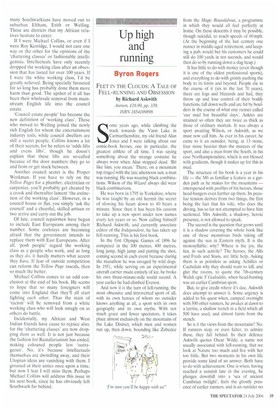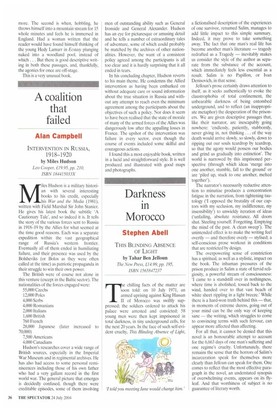Up high and running
Byron Rogers
FEET IN THE CLOUDS: A TALE OF FELL-RUNNING AND OBSESSION by Richard Askwith
Aurum, 416.99, pp. 339, ISBN 1854109898
Some years ago, while climbing the track towards the Vann Lake in Carmarthenshire, my old friend Alan Jones and I were talking about our comic-book heroes, one in particular, the greatest athlete of all time. I was saying something about the strange costume he always wore when Alan stopped dead. 'Bit like him, you mean.' There, on a mountain top ringed with the late afternoon sun, a man was running. He was wearing black combinations. Wilson of the Wizard always did wear black combinations.
He was born in 1795 in Yorkshire, where he was taught by an old hermit the secret of slowing his heart down to 40 beats a minute. Since then it has been his custom to take up a new sport under new names every ten years or so. Now calling himself Richard Askwith, and currently associate editor of the Independent, he has taken up fell-running. This is his first book.
In the first Olympic Games of 1896 he competed in the 100 metres. 400 metres, long jump, high jump and putting the shot, coming second in each event because during the marathon he was savaged by wild dogs. In 1951, while serving on an experimental aircraft carrier made entirely of ice, he broke his own three-minute-mile world record. A year earlier he had climbed Everest.
And now it is the turn of fell-running, the most obsessive and introverted sport of all, with its own heroes of whom no outsider knows anything at all, a sport with its own geography and its own myths. With not much grace and fewer spectators, it takes place almost exclusively on the mountains of the Lake District, which men and women run up, then down, bounding like Zebedee from the Magic Roundabout, a programme in which they would all feel perfectly at home. On these descents it may be possible, though suicidal, to reach speeds of 60 mph. (At the beginning of the last century one runner in middle-aged retirement, and keeping a pub, would bet his customers he could still do 100 yards in ten seconds, and would then do so by running down a slag heap.) It has little to do with money (even though it is one of the oldest professional sports), and everything to do with grimly pushing the body to its limits and beyond. People die in the course of it (six in the last 70 years), there are fogs and blizzards and hail, they throw up and lose control of their bodily functions, fall down wells and are hit by boulders in the course of what one runner called 'our mad but beautiful days'. Ankles are strained so often they are twice as thick as those of ordinary mortals_ It was always a sport awaiting Wilson, or Askwith, as we must now call him. As ever in his career, he came to it an outsider, being, at 13 stone, four stone heavier than the masters of the sport, and also a man from the South, in his case Northamptonshire, which is not blessed with gradients, though it makes up for this in mud.
The structure of his book is a year in his life — the M6 as familiar a feature as a garden path as he makes for the mountains — interspersed with profiles of his heroes, those head-bangers even further up them. Its peculiar tension derives from two things, the first being the fact that his wife, who does the driving, has so far not attempted to have him sectioned. Mrs Askwith, a shadowy, heroic presence, is not allowed to speak.
The second is the question that grows until it is a shadow covering the whole book like one of those monstrous birds taking off against the sun in Eastern myth. It is the monosyllable: why? Where is the joy, the fun, in such activity? The heroes, the Alfs and Freds and Stans, are little help. Asking them is as pointless as asking Achilles or Cuchulain why they should want to kill, and glut the ravens, to quote the 7th-century Welsh epic Y Gododdin, when head-hunting was an earlier Cumbrian sport.
But, to give credit where it's due, Askwith does attempt to answer it. Some urgency is added to his quest when, camped overnight with 500 other runners, he awakes at dawn to a latrine, a shallow trench in a field which all 500 have used, and almost faints from the stench.
So is it the views from the mountains? No. If runners stop, or even falter, to admire these, they fall behind. In their defence Askwith quotes Oscar Wilde, a name not usually associated with fell-running, that we look at Nature too much and live with her too little. But two moments in his own life provide some kind of an answer. Both have to do with achievement. One is when, having reached a summit late in the evening, he plunges downhill into a 'sea of ancient Cumbrian twilight', feels the ghostly presence of earlier runners, and is an outsider no
more. The second is when, hobbling, he throws himself into a mountain stream for 15 whole minutes and feels he is immersed in England. Had a woman written that the reader would have found himself thinking of the young Hedy Lamarr in Ecstasy plunging naked into a woodland pool, instead of which. . . But there is good descriptive writing in both these passages, and, thankfully, the agonies for once are off-stage.
This is a very unusual book.



























































 Previous page
Previous page